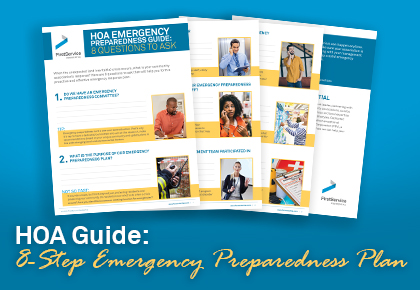-
Can Your HOA Handle a Crisis? 8-Step Emergency Preparedness Plan
Is your HOA ready for a crisis, or does your emergency plan need improvement? Download a complimentary guide, HOA Emergency Preparedness Guide: 8 Questions to Ask . -
Finding The Right Lifestyle Community For You – Five Things to Consider
Are you considering moving to a community with more lifestyle elements? How do you choose which one is right for you? Do you research and consider these five tips to ensure you find your perfect match! -
5 Surprising Reasons to Raise Your HOA Assessments
If your main concern is to avoid increasing assessments, you may want to reconsider. As a board member, one of your primary fiduciary responsibilities is to protect property values, and assessments are an investment that helps do just that. -
Your HOA Board and Coronavirus: 5 Questions to Discuss
How should your HOA board handle a pandemic like COVID-19? Start by tackling these 5 questions -

Can Your HOA Handle a Crisis? 8-Step Emergency Preparedness Plan
Is your HOA ready for a crisis, or does your emergency plan need improvement? Download a complimentary guide, HOA Emergency Preparedness. -
Don’t Be the HOA Bad Guy: 4 Proven Policy Enforcement Tips
Enforcing HOA policies is nobody’s cup of tea, but having good policy enforcement in place helps improve the resident experience and elevates your reputation. Follow these 4 principles for healthy policy enforcement: -
Navigating HOA On-Site Parking Policies: Best Practices
Because on-site parking draws out strong opinions from both residents and board members, it’s imperative that associations be educated about on-site parking and understand what they can and cannot do, especially in regard to resident demands. With such a broad stretch of opinions, how do you approach on-street parking policy as an HOA member? -

Reserve Funds, Assessment, or Loan: 3 Ways to Pay for a Capital Improvement Fee
Great capital improvements lead to better property values. Read on to see the three ways to pay for them and the pros and cons for each. -
Seven High-Rise Insurance Tips for Associations and Unit Owners
Many people who live in cities like Phoenix and Scottsdale appreciate the rewards that come with living in a high-rise building. Some of the unique advantages include great amenities, security and even concierge services. High-rise buildings are also unique when it comes to insurance coverage. Besides the individual policies that unit owners need to have, the building and common areas must be covered as well. -
The Strategic Community Plan - A Road Map for the Future
Is your community interested in introducing a Strategic Community Plan? Read more to learn about the benefits of having a Strategic Community Plan in place and how to introduce them into your association. -
3 Strategies to Keep HOA Assessments Stable and Add Value
There are often valid reasons to raise assessments, but in some cases, you may want to take a different route. Here are three cost-saving strategies. -
Why Master and Sub-Associations Should be Managed by the Same Community Management Company
Have you ever been in a situation where you didn't know who to call when an issue in your HOA came up because you live in a sub-association of a master-planned community that has two different community management companies? This is a consistent challenge for many homeowners living in multiple managed communities. -
Smart Financial Planning
Safeguarding a strata corporation’s operating and reserve funds is one of the main fiduciary duties of all board members, not just the treasurer. This means strata councils must protect the financial interests of the strata corporation and its members. -
Can Your HOA Handle a Crisis? 8-Step Emergency Preparedness Plan
Is your association really prepared for an emergency? Learn how to develop an HOA emergency preparedness plan in 8 steps. -
Your HOA Board and Coronavirus: 5 Questions to Discuss
How should your HOA board handle a pandemic like COVID-19? Start by tackling these 5 questions. -
How to prepare for an earthquake and its aftermath in California
An earthquake in California can strike at any time, and they are daily occurrences throughout the state with varying impact and magnitude, with approximately 10,000 taking place each year. -
More California Homebuyers Look for Community Amenities and Lifestyle Programs
Homebuyers are motivated to buy a new home and move to a new community for a wide variety of reasons – perhaps a desire to downsize, upsize, relocate closer to family and friends, or enhance their quality of life. But while those factors will always be important, there are two additional considerations many people find compelling – community amenities and programs for lifestyle communities. Read on for more details. -
Post-Crisis HOA Cash Management: 3 Tips for Your Association
How do manage collections and HOA funds after a crisis? Get 3 tips to help you plan for the future -
Preventing Cyber Attacks, Part 3: Your HOA’s 4-Step Digital Defense Plan
Without a doubt, digital technology has made our everyday tasks easier and more convenient than ever. Mobile phones and tablets allow you to pay monthly bills, upload family photos and store important documents in “the cloud” with just a few taps and swipes. Homeowners associations are taking advantage of this pervasive technology in droves, using property management software to expedite resident transactions, sign documents with electronic signatures, and perform tasks more efficiently. -
Reserve Funds, Assessment or Loan: 3 Ways to Pay for Capital Improvements
Strategic capital improvements lead to better property values. Read on to see the three ways to pay for them and their pros and cons. -

3 Strategies to Keep HOA Assessments Stable and Add Value
There are often good reasons to raise assessments, but in some cases, you may be able to take a different route. Here are three strategies to help save your HOA money and keep assessments stable. -
Active Adult Communities: Not Your Grandma’s Retirement Home
The Baby Boomers, born after World War II, are the largest generation in United States history. The last of them turns 55 in 2019. With their children grown and in their own homes, Boomers are entering an era in which they can do what they please. They are retiring or scaling back on full-time work and it’s their time in the sun. Literally. They may be getting older, but as the first generation of Americans to embrace the fitness craze and eating with longevity and well-being in mind, the Baby Boomers (and Generation X on their heels) are not planning to sit out their golden years in a rocking chair. -
Tips to choose the right active adult community
According to the U.S. Census Bureau, 76.4 million baby boomers were born between the years 1946 – 1964 – and in a few years, they’ll all be 55 or older. With their vibrant lifestyles and dedication to health and fitness, today’s active adults are more dynamic and full of life than any generation that preceded them – so dynamic, in fact, that many are choosing to move into communities that better fit their lifestyles. And no matter whether they’re looking to downsize or live large, enjoy retirement or move closer to work, soak up the warmth in a resort-like setting or go cosmopolitan and move to a big city, many people 55 and over are finding what they’re looking for in active adult communities. -
Active Adult Living: Marketing Amenities for Broad Appeal
Successful active adult communities offer amenities that are suited to their residents, who may span several generations -- and multiple interests. It can be challenging to determine the active adult amenities, programs and services that fit best, but in his guest blog for Multi-Housing News, FirstService Residential's Michael Mendillo offers several clear and effective guidelines.